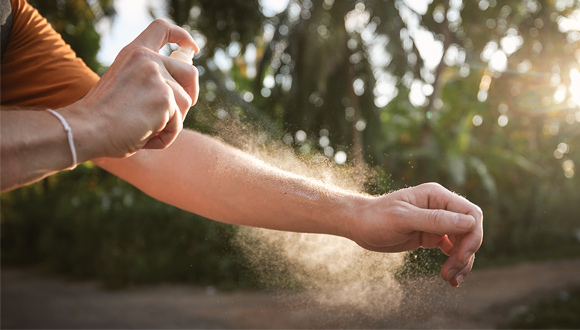Is DEET Bad for You? (& 4 More Questions About Bug Spray, Answered)
April 28, 2022 - Katie McCallumIf you live in an area where mosquitos are prevalent, you know how important bug spray is during warmer months.
For starters, mosquito bites hurt and itch.
Then there's the concern of mosquito-borne disease — when illness-causing germs, such as West Nile or Zika virus, get passed from infected mosquito to person via a bite.
"People in the U.S. don't need to be overly concerned about mosquito-borne illness since it's a fairly rare occurrence, but there is still a slight risk," says Dr. Wesley Long, director of diagnostic microbiology at Houston Methodist. "This means that it's important to take mosquito control seriously."
One of the most important forms of mosquito control is to wear bug spray when you plan to be outdoors during mosquito season — which can start as early as February and end as late as November for Gulf Coast residents.
Here are answers to five common questions about bug spray:
How does bug spray work?
When we think of bug spray, we often think of killing insects using toxic chemicals. Some bug sprays do work that way, but not insect repellent.
Instead, mosquito repellent works by simply making a person or area less attractive to these pests — that is, it interferes with how mosquitos sense the cues that signal someone to feed on is nearby.
Which mosquito repellent is best?
There are many homemade concoctions touted to repel mosquitos — such as citrus and lemon eucalyptus essential oil sprays — but it's important to note that these ingredients haven't been evaluated for their effectiveness by the Environmental Protection Agency (EPA).
Instead, the CDC recommends using a repellent that contains chemicals proven to keep mosquitos away and is registered and approved by the EPA, especially in areas where mosquito-borne disease is a serious issue.
An EPA-registered insect repellent will contain one of the following active ingredients:
- DEET
- Picaridin
- IR3535
- Oil of lemon eucalyptus (OLE), which should not be confused with lemon eucalyptus essential oil
- Para-menthane-diol (PMD)
- 2-undecanone
So, which of the options above makes for the best mosquito repellent?
The CDC states that DEET offers the best protection against mosquito bites.
That being said, all of the active ingredients listed above are tested and proven to be a safe and effective way to repel mosquitos.
"Essentially, these are the chemicals that both work and are safe, even for women who are pregnant or breastfeeding. There are two important rules for safe use in children and babies, though," adds Dr. Long.
- Never put any type of bug spray on infants younger than 2 months
- Repellents containing OLE and PMD should not be used on children younger than 3 years old
Is DEET bad for you?
Despite its usage in bug sprays for more than 60 years, some people question whether DEET is safe.
According to the CDC, DEET isn't harmful — even for women who are pregnant or breastfeeding — as long as it is used safely and correctly.
"When using a DEET-based mosquito repellent, just be sure to follow the directions and precautions listed on the product," says Dr. Long. "Pay attention to how you're applying it, especially with children."
For instance, most advise against putting bug spray on a child's hands since kids are so notorious for putting them in their eyes, nose and mouth.
It's also important to understand what the concentration of DEET in a repellent really means. Products containing higher amounts of DEET don't always work better; they simply last longer. This is especially true for concentrations above 50%, which provide no added benefit beyond offering a longer duration of protection. As a frame of reference, a DEET concentration of 10% lasts about two hours.
Also, parents should note that the American Academy of Pediatrics says that the maximum concentration currently recommended for children is no more 30% DEET. And remember that admonition to never put any type of bug spray — even DEET-free options — on infants younger than 2 months old.
What's the right way to apply mosquito repellent?
"You want to be careful about much bug spray you're applying and how often you reapply," says Dr. Long. "Follow the directions and be safe. You don't want to overdo it unnecessarily in an overzealous attempt to protect yourself."
Here are the do's and don'ts of applying mosquito repellent:
- DO apply bug spray to any skin that's exposed
- DO be sure to read the label to understand how much of the product to apply
- DO apply sunscreen before applying bug spray
- DO reapply as needed, but only as often as indicated on the product label
- DO consider washing your skin with soap and water when returning indoors
- DON'T spray underneath your clothing as this may cause your skin to absorb more repellent than is known to be safe
- DON'T spray directly onto your face (instead, spray into your hand and rub onto your face, avoiding your eyes and nose)
- DON'T spray in enclosed spaces or near food
Are there additional ways to repel mosquitos?
Applying bug spray isn't the only form of mosquito control that's important.
Additional ways to protect yourself from mosquitos include:
- Wearing long sleeves and pants outdoors when possible
- Covering baby strollers or carriers with mosquito netting
- Only leaving a door or window open if it has a screen
- Running a fan on your porch or other outdoor seating areas to create turbulent airflow
There are also steps you can take to control mosquitos around your yard.
"Another really important step is to eliminate standing water around your home," says Dr. Long. "A mosquito needs very little water to lay its eggs, so be sure to dump out plant pots that are holding water and find ways to drain even small amounts of standing water."








